"An Open Letter to the Chinese People" by Pearl Buck

This is a working manuscript by Nobel Prizewinning author Pearl S. Buck, including ink and pencil corrections, written during the Japanese invasion of China and the war that ensued.


This is a working manuscript by Nobel Prizewinning author Pearl S. Buck, including ink and pencil corrections, written during the Japanese invasion of China and the war that ensued.
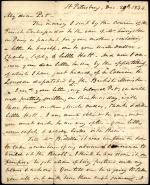
Minister to Russia William Wilkins writes to his daughter, whom he calls "Pet." Wilkins says that he received her letter and describes packages he sent with Mr. Livingstone. He also says that Mr.
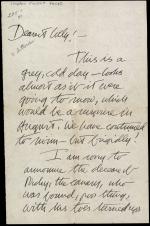
Stephen Vincent Benét writes to his sister, Laura Benét, on the slowness of his writing and distress over news from abroad. Includes envelope.

James M. McKim, a member of the Class of 1828 and an editor at the Philadelphia based The Anti-Slavery Standard, writes to a subscriber, Mr. Worrell.
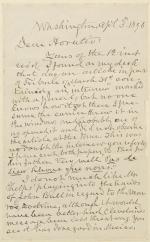
Horatio King writes a personal letter to his son, Horatio Collins King (Class of 1858), and comments on a Mr. Phelps, "John Bull" and the Monroe Doctrine, President Grover Cleveland, as well as events in Mexico and Oregon.
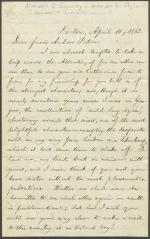
Moncure D. Conway carries a letter for abolitionist William L. Garrison, who writes from Boston to his friend, Andrew Paton in Glasgow, Scotland, and introduces Conway in terms of highest commendation.
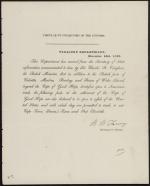
Treasury Secretary Roger Brooke Taney sends this Circular letter to the Collectors of Customs and announces the opening of additional British ports (Cape Town, Simon's Town, and Port Elizabeth) to American trade.
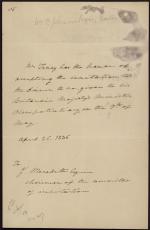
Supreme Court Chief Justice Roger B. Taney writes to J. Meredith and accepts an invitation to a dinner given in honor of the British Minister. A note on the reverse side states that Taney ultimately did not attend.

Spencer Fullerton Baird (Class of 1840) writes to Osmond Tiffany, responding to the latter's request for documents about the Pacific Rail Road and the Mexican Boundary.

Attorney Roger Brooke Taney writes to Senator Samuel Smith and discuses his thoughts upon treaty making authority and obligations of the President and Congress, referencing France and an act of 1793 as well as Georgia in treaty with Native Am

Supreme Court Chief Justice Roger Brooke Taney writes to David Hoffman and explains why he must "decline taking any part in matters" relating "to the mission to Austria." While Taney would prefer to meet with Hoffman to discuss this issue, he not
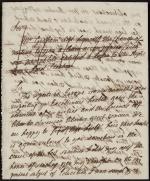
Draft of a Catharine Macaulay Graham's letter to President George Washington. Graham expresses concern for Washington's health and the French Revolution. Transcript included.

US Minister to the United Kingdom James Buchanan thanks Sir William Molesworth for his speech on "Naval Prizes." While "the agreement is unanswerable," Buchanan tells Molesworth that he "presented more historical information on the subject, in a c

President James Buchanan responds to John A. Wilstach's letter about domestic issues and foreign affairs.

Charles Nisbet writes bookseller William Young to discuss various political and religious events in France, Ireland, and the United States.
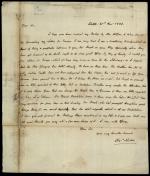
Charles Nisbet writes to bookseller William Young regarding a packet from an unspecified Mr. Wilson with two letters for Europe. Nisbet also asks for a paper, discusses Carlisle weather, and speculates about the French Revolution.
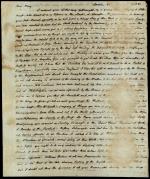
Charles Nisbet writes to his daughter Mary, discussing the theater in Carlisle, the Democrats, and the French.

Richard Rush writes to Michael Hogan, confirming that he received Hogan's letter and passed on its contents to the Secretary of State.
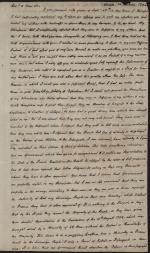
Charles Nisbet writes Ashbel Green to acknowledge Green's letter from September 12th and to justify questions about Green's intent in giving Nisbet's private letters to his political opponents.
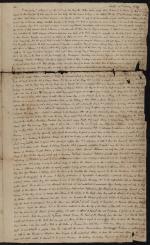
Dickinson College President Charles Nisbet writes to Dr. Jonathan Ingham of Bucks County, Pennsylvania with reflections on education, politics, international affairs, as well as other contemporary American issues. Transcript included.

Acting Secretary of State Richard Rush writes to Jonathan Russell, the United States minister to Sweden and Norway, regarding "the claims of several citizens of the U.
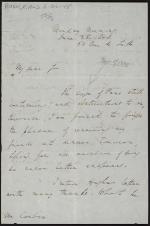
Richard Rush, United States Minister to France, informs a Mr.

William Bingham writes to Thomas Fitzsimons on Britain's attitude toward the United States in political and commercial affairs. Bingham is a member of the Dickinson College Board of Trustees.

John Dickinson writes to Benjamin Rush and offers the idea for the commission of William Bingham, a trustee, to solicit funds for Dickinson College in England. Transcript included.

William Bingham writes from London to John Montgomery in Carlisle, Pennsylvania. Bingham discusses the prospect of British aid to the new college and comments on the conflict between the United States and the United Kingdom.